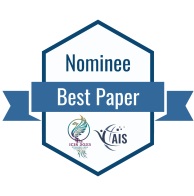Loading...
Paper Number
1806
Paper Type
Completed
Description
After many years of reluctance and lack of commitment, companies are increasingly prioritizing sustainability and setting ambitious goals. Along with the rise of organizational sustainability strategy (OSS), the role of information systems (IS) in sustainability has increased and become a source of sustainability at the organizational level. Although ever more companies consider sustainability a top priority, they struggle to turn sustainability strategies into practice and observe measurable results. We followed a mixed methods approach combining qualitative interview data (n=13) and quantitative data from a multi-continental industry survey (n=551) to generate an in-depth understanding of the role of IS-enabled sustainability practices in influencing the organizational sustainability strategy-implementation gap. With our study, we demonstrate that IS-enabled sustainability practices mediate the impact of OSS on organizational sustainability performance (OSP) and that these practices are enabled by IS capabilities that are critical to implementing sustainability practices (technology intelligence, data analysis, and digital twinning capability).
Recommended Citation
Wagner, Franziska; Ixmeier, Anne; and Kranz, Johann, "From Words to Results: The Role of IS in Bridging the Sustainability Strategy-Implementation Gap" (2023). ICIS 2023 Proceedings. 18.
https://aisel.aisnet.org/icis2023/soc_impactIS/soc_impactIS/18
From Words to Results: The Role of IS in Bridging the Sustainability Strategy-Implementation Gap
After many years of reluctance and lack of commitment, companies are increasingly prioritizing sustainability and setting ambitious goals. Along with the rise of organizational sustainability strategy (OSS), the role of information systems (IS) in sustainability has increased and become a source of sustainability at the organizational level. Although ever more companies consider sustainability a top priority, they struggle to turn sustainability strategies into practice and observe measurable results. We followed a mixed methods approach combining qualitative interview data (n=13) and quantitative data from a multi-continental industry survey (n=551) to generate an in-depth understanding of the role of IS-enabled sustainability practices in influencing the organizational sustainability strategy-implementation gap. With our study, we demonstrate that IS-enabled sustainability practices mediate the impact of OSS on organizational sustainability performance (OSP) and that these practices are enabled by IS capabilities that are critical to implementing sustainability practices (technology intelligence, data analysis, and digital twinning capability).
When commenting on articles, please be friendly, welcoming, respectful and abide by the AIS eLibrary Discussion Thread Code of Conduct posted here.




Comments
05-SocImpact